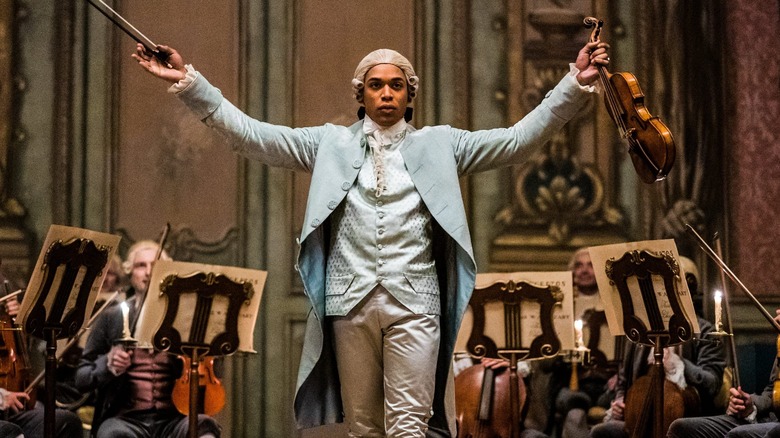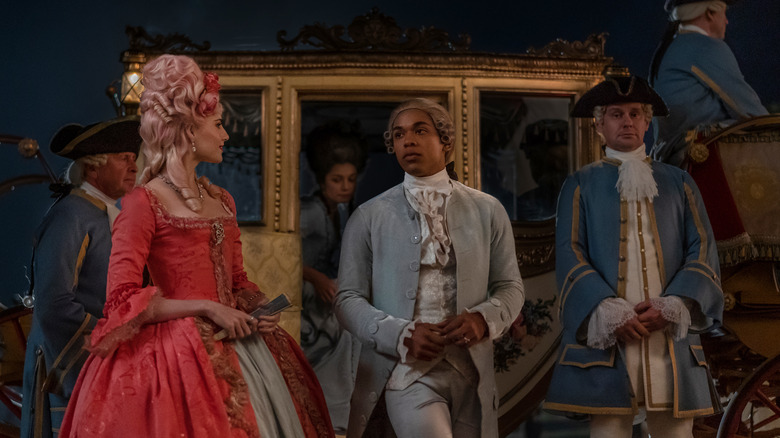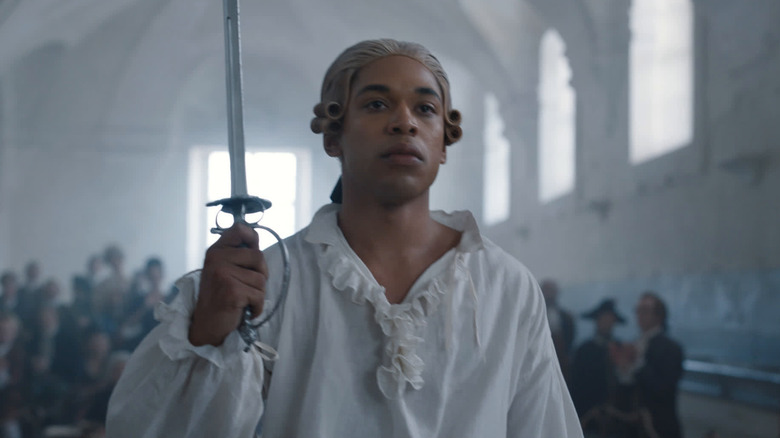Chevalier Review: A Soapy Take On The Life Of Joseph Bologne
- An arresting lead performance from Kelvin Harrison Jr.
- A satisfying embrace of soapiness
- Doesn't feel like a comprehensive, historically accurate account of Joseph Bologne's life
- The era itself isn't brought to life quite as vividly as the character
When bringing the story of a historically overlooked figure to the screen, is there a responsibility to stick to the facts? Or should creative freedom be encouraged, to find a way to get modern audiences to care about these long-ago faces? The soapy biopic "Chevalier" opts for the latter approach, depicting the life of 18th-century composer Joseph Bologne, Chevalier de Saint-Georges with all the tropes you'd expect from a music-centric flick. This is most evident in Kelvin Harrison Jr.'s lead performance: He plays him like a stereotypical cocky, swaggering rock star who is assured of his own genius.
The film's best moments come when it bends the truth entirely to fit its portrait of an ahead-of-his-time musical icon. An early sequence in which our hero disrupts Mozart's Paris concert to jump on stage and prove that he's the far more accomplished violinist of the two is a particular highlight. It doesn't take much post-screening reading to discover this moment has no basis in historical fact: Saint-Georges was already performing for Marie Antoinette's court by the time Mozart arrived in France, and was not desperately in need of making a name for himself. But this isn't a flaw: "Chevalier" effectively uses this rock star posturing to set the larger record straight. The results are uneven, but enjoyable.
An unwritten history ...
Director Stephen Williams and screenwriter Stefani Robinson decide to address their subject's overlooked place in history directly in the opening act. A single sequence outlines his superior musical abilities and cultural standing at the peak of his powers (as well as offering something of a cheeky narrative reversal of Salieri's relationship with Mozart in "Amadeus" — now it's Mozart who has been upstaged). "Chevalier" goes on to argue the only reason he isn't remembered as a dominant force in classical music is because of pervasive racism. Saint-Georges is a more complicated figure than such a broad crowdpleaser can properly dissect, but such liberties need to be taken when a film's priority is getting its subject the recognition that has eluded him for centuries.
Due to conflicting accounts of his life, "Chevalier" can't operate as an authoritative exploration of its subject, but it does act as the perfect gateway for a wider discussion about his rise to fame within a changing country. That cultural context is explored with less depth than the man himself, however. Williams' film briskly moves past the composer's childhood to his rise in French high society, where fascination with his talents doesn't entirely obscure his place as the "other." He may be favored by the ghoulish Marie Antoinette (Lucy Boynton), but his race still hampers his higher ambitions. "Chevalier" follows his struggle to become head of the Paris Opera, here dramatized as a competition assigned by the queen, in which Saint-Georges and his white opponent vie to write the best original opera.
Very few of Saint-Georges' compositions have survived, which is likely why the creative team opted to focus on the behind-the-scenes machinations of a production that never saw the light of day. In reality, Saint-Georges lost the Paris Opera gig because of the racism of the period's opera performers; they successfully petitioned against working with a Black man. But this shift in narrative allows the film to encompass more of his life story. It's a textbook biopic trick to streamline several years into one devastating period of upheaval, enveloping one professional struggle with a lifetime of personal ones. These range from complicated romantic relationships (with Samara Weaving's Marie-Josephine de Montalembert, the proposed lead of his opera) to platonic ones (Saint-Georges becomes more sympathetic to the anti-monarchist cause after their interventions in his career).
... Which leaves you wanting more
"Chevalier" explores a fascinating period in history, well-documented yet seldom depicted from this perspective. This tale takes place concurrently with the implementation of the "Code Noir," which ensured slavery was still practiced in the French colonies, if not in France itself. This legislation, issued from the heart of Paris, brings an extra layer of tension to Saint-Georges' relationships within high society. Frustratingly, it falls entirely on Harrison Jr. to depict this lingering paranoia; it isn't inherent within the screenplay. The actor succeeds in bringing this to life, though: The injustice simmers until Saint-Georges finally has no choice but to air his frustrations to a cultural elite that has all but abandoned him.
The most complicated aspect of this movie is the way Saint-Georges is reimagined as a cliched rock star. This makes him an arresting lead for a soapy drama that feels less interested in capturing historical facts than in establishing him as a major force who demands inclusion in the history books. But it also means that the film stumbles when it comes to addressing the wider prejudices of the era, as the period is not brought to life as assuredly as the character himself.
Despite the sheer entertainment factor of "Chevalier," it feels like it only scratches the surface of this story. We tackle the main bullet points of this period, but not in a manner that feels lived-in. The fact that Saint-Georges increasingly walked in two different worlds — welcomed to perform for the monarchy whilst keenly involved with those demanding the abolition of it — should provide enough narrative meat to grapple with the wide-ranging social tensions of the time. But this is afforded less screen time than his relationship with Samara Weaving's character. This bond is still defined by racism (almost entirely through the violent protestations of her husband, who is aghast that she would collaborate with a Black man), but it's far less dramatically engaging than exploring the wider racist culture of the period that made his success an anomaly would have been. What results is a fleshed-out — if far from historically accurate — portrait of a fascinating man. But the era around him isn't brought to life quite as vividly, which makes it less impactful.


